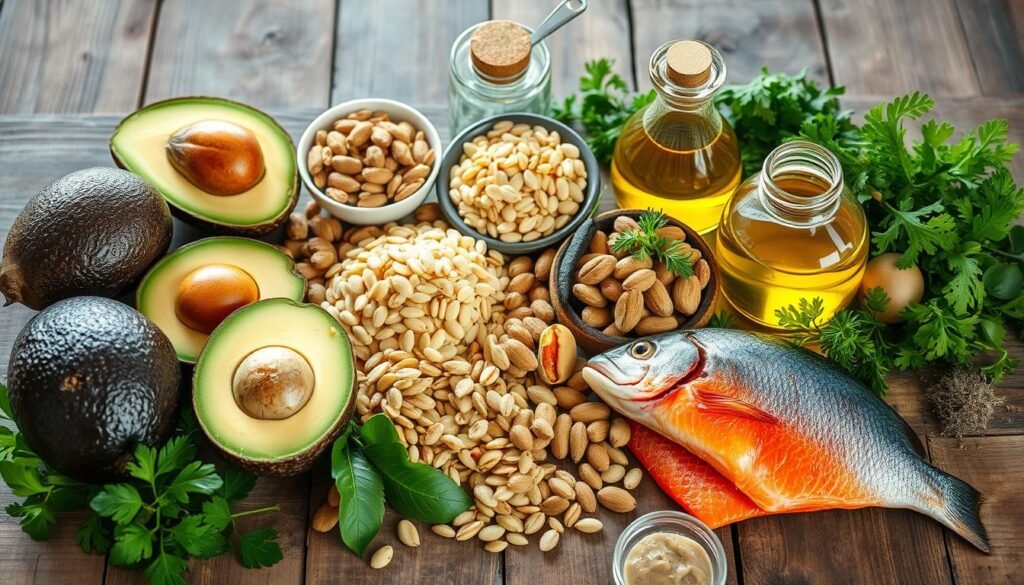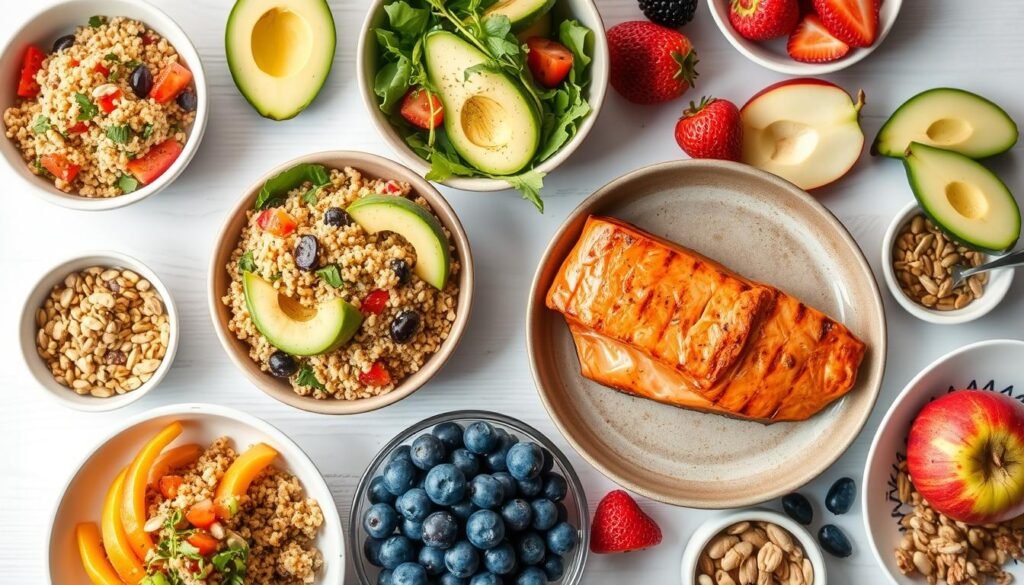Surprisingly, at least 10 percent of American women have Polycystic Ovary Syndrome (PCOS). The actual figure could be up to 25 percent because many cases go undiagnosed. This condition can bring on weight gain, irregular periods, insulin resistance, and infertility. These symptoms can greatly affect a woman’s life quality. However, choosing the right foods for PCOS can lead to better health and symptom control.
A good PCOS diet focuses on high-fiber foods, healthy fats, and protein. This balance helps regulate hormones and improve insulin sensitivity. Adding vegetables, lean proteins, and whole grains helps with weight control. It also boosts digestive health and overall body function. Women should aim for five to seven servings of high-fiber veggies and four to six servings of healthy fats each week for the best outcome.
Learning about and using these nutrition tips can build a healthier lifestyle and ease PCOS symptoms. Every small dietary change can bring big benefits. It gives women effective tools to manage this widespread condition.
Key Takeaways
- PCOS affects 10 to 25 percent of women in the U.S., leading to various health issues.
- A balanced diet rich in high-fiber foods, healthy fats, and proteins is essential for managing PCOS.
- Specific serving recommendations can guide women in curating their diets for symptom relief.
- Nutrient-dense foods can improve hormone regulation and insulin sensitivity.
- Sustainable lifestyle changes, including diet and exercise, can positively impact PCOS management.
Understanding PCOS and Its Health Impacts
Polycystic Ovary Syndrome (PCOS) is a complicated hormonal disorder. It affects about 15% of women around the world. It’s marked by inconsistent menstrual cycles, high androgen levels, and ovarian cysts.
These lead to serious health impacts like more risk for obesity, heart disease, and type 2 diabetes.
A big factor in these problems is the hormone imbalance. Many studies show that 50-75% of women with PCOS have insulin resistance. This can cause high blood sugar, ongoing inflammation, and weight gain.
This resistance triggers many upsetting symptoms. They include lots of hair growth, acne, feeling tired, being anxious, mood swings, irregular periods, and trouble getting pregnant.
Handling PCOS means focusing a lot on what you eat. Eating well can help with insulin sensitivity and lower androgen levels. It’s good to eat small, healthy meals through the day.
Before you’re active, it’s wise to have a bit bigger meals. Try to dodge short-term diets or very strict eating plans. They might not help in the long run.
Eating a nutrient-rich diet can ease some PCOS symptoms. Foods with a low glycemic index keep insulin levels steady, lowering blood sugar risks. Eating regularly also improves insulin sensitivity, leading to better health.
| Health Impact | Description |
|---|---|
| Obesity | Higher likelihood due to insulin resistance and hormonal changes |
| Heart Disease | Increased risk associated with insulin stability and weight management |
| Type 2 Diabetes | Often linked with insulin resistance prevalent in PCOS |
| Menstrual Irregularities | Commonly caused by hormone imbalance |
| Fertility Issues | Irregular ovulation can complicate conception |
Understanding these health issues shows why it’s crucial to manage them well. By making smart food choices and changing your lifestyle, you can better manage the challenges of Polycystic Ovary Syndrome.
Importance of Nutrition in Managing PCOS
Nutrition plays a key role in handling PCOS, especially because it’s linked to insulin resistance and inflammation. Eating healthy can lessen PCOS symptoms. Since a high number of women with PCOS get diabetes by 40, managing nutrition is key. A balanced diet with nutrient-rich foods reduces symptoms and health risks.
Adding high-protein foods into a diet helps a lot with PCOS. Studies show that high-protein diets help those with type 2 diabetes manage their blood sugar levels in six weeks. A study in Denmark found that women with PCOS lost about nine pounds of body fat on a high-protein, low-carb diet over six months.
High-protein diets also make insulin work better and can lower high testosterone levels in PCOS. Diet experts say that protein should be 10 to 35% of daily calories, as the Health Department suggests.
It’s good to eat different protein sources, like:
- Almonds
- Eggs
- Greek yogurt
- Quinoa
- Lean meats
- Beans and legumes
Eating a lot of fiber-rich whole grains, cutting down on added sugars, and following a Mediterranean Diet help manage PCOS well. These steps help with weight control, keeping blood sugar steady, and balancing hormones.
So, choosing what you eat carefully is the core of handling PCOS well. This leads to better health and life quality for women with the condition.
How Fiber Assists in Managing PCOS
Fiber is key in managing Polycystic Ovary Syndrome (PCOS). It helps keep blood sugar stable and improves digestion. For those dealing with PCOS, a high-fiber diet can ease metabolic problems. These include insulin resistance and high blood sugar levels.
Benefits of Fiber for Blood Sugar Control
Including fiber in a PCOS diet benefits blood sugar control and weight management. Boosting fiber intake helps prevent insulin spikes. This is crucial as 50-70% of women with PCOS struggle with insulin resistance. Eating more fiber can reduce the risk of type 2 diabetes, a common issue for PCOS patients.
High-Fiber Foods to Include in Your Diet
To enjoy fiber’s benefits, add high-fiber foods to your diet. These foods are great for blood sugar control and gut health. Some top high-fiber choices include:
- Whole grains: Oats, brown rice, and quinoa
- Legumes: Beans, lentils, and chickpeas
- Fruits: Berries, pears, and apples
- Non-starchy vegetables: Broccoli, spinach, and kale
- Nuts and seeds: Almonds, chia seeds, and flaxseeds
These foods not only help with digestion but also make you feel full longer. This leads to healthier eating habits for those with PCOS.
| Food Group | Examples | Fiber Content (per 100g) |
|---|---|---|
| Whole Grains | Oats, Brown Rice, Quinoa | 7g |
| Legumes | Beans, Lentils, Chickpeas | 8g |
| Fruits | Berries, Pears, Apples | 3-5g |
| Non-starchy Vegetables | Broccoli, Spinach, Kale | 2-4g |
| Nuts and Seeds | Almonds, Chia Seeds, Flaxseeds | 5-9g |
A high-fiber diet plays a big role in managing PCOS, leading to better health outcomes and quality of life.
Healthy Fats: Essential for Hormonal Balance
Healthy fats are key in regulating hormones for PCOS sufferers. By adding various healthy fats to meals, one can better manage hormonal balance. This helps improve insulin sensitivity and decrease inflammation. Such diet changes can boost well-being for those with PCOS.
Types of Healthy Fats to Incorporate
Adding healthy fats to your diet brings many benefits. Consider including these types:
- Olive oil
- Avocados
- Nuts (such as almonds and walnuts)
- Seeds (including flaxseeds and chia seeds)
- Coconut oil
Omega-3 Fatty Acids and Their Role in PCOS
Omega-3 fatty acids, in foods like salmon and sardines, are especially beneficial for PCOS. These fats reduce inflammation, better insulin resistance, and help stabilize blood lipid levels. Eating foods high in omega-3s aids in managing PCOS symptoms and boosts fertility.

| Healthy Fats | Sources | Benefits |
|---|---|---|
| Monounsaturated Fats | Olive oil, avocados, nuts | Supports heart health and reduces inflammation |
| Polyunsaturated Fats (Omega-3) | Fatty fish, flaxseeds, walnuts | Reduces inflammation, improves hormonal balance |
| Saturated Fats | Coconut oil, dairy products | Provides energy; moderation is key |
Nutritional Choices for PCOS: How Fiber, Healthy Fats, and Protein Help
Making smart nutritional choices for PCOS is key. A diet rich in fiber, healthy fats, and lean protein helps a lot. About 35–80% of people with PCOS have insulin resistance. Addressing this through diet is crucial. Fiber helps control blood sugar well. A 2019 study showed higher fiber intake means lower insulin resistance and less body fat in PCOS patients.
Most Americans only eat about 15g of fiber each day. This is less than the recommended 14g per 1,000 calories. For PCOS symptoms, upping fiber intake can make a big difference. Eating more fruits, vegetables, and whole grains improves health. These whole, unprocessed foods also help with keeping a healthy weight.
Eating healthy fats, like omega-3s, is important for balancing hormones. Foods like fatty fish, walnuts, and flaxseeds are great choices. Lean protein is just as crucial. A study in 2012 found that a high-protein diet helped women with PCOS lose about 9.7 pounds over six months. This shows the importance of a balanced diet for health.
Staying active and getting enough sleep are vital too. The CDC recommends 30 minutes of exercise five times a week. They also suggest sleeping at least seven hours each night. Combining these habits with a focus on nutritious foods helps manage PCOS effectively.
By focusing on the right foods for PCOS, women can better manage their symptoms. Trying different meal planning methods and eating a variety of fiber, fats, and protein can help. For more tips on changing your diet for PCOS, check out Hopkins Medicine and Sparkle Your Serenity.
| Key Nutrients | Benefits for PCOS | Sources |
|---|---|---|
| Fiber | Improves insulin resistance, supports weight management | Fruits, vegetables, whole grains, legumes |
| Healthy Fats | Promotes hormonal balance, reduces inflammation | Fatty fish, nuts, seeds, avocados |
| Protein | Aids in weight loss and satiety | Lean meats, eggs, dairy, legumes |
Lean Protein Sources for a Balanced Diet
Adding lean protein to a balanced diet helps manage Polycystic Ovary Syndrome (PCOS). These proteins provide amino acids that are needed for muscle upkeep, aid in controlling weight, and keep blood sugar stable. This is especially good for those working on PCOS nutrition plans.
Benefits of Including Protein in Meals
Eating protein-rich foods in your meals can make you feel full, cutting down on sugar cravings. Lean proteins like skinless chicken, fish, tofu, and beans offer lots of nutrients without the bad fats. Having a variety of proteins is key to staying healthy, especially if you have hormone issues.
Adding colorful fruits and veggies helps balance blood sugar and improves digestion, both important for managing PCOS. Foods like quinoa and oats also help with blood sugar and weight control. Making these food choices can have a big impact on your health.
When planning your meals, it’s important to avoid foods that could make PCOS worse. Focusing on fresh, whole foods is a good strategy for a healthier life. To learn more about a diet that works for PCOS, check out this resource. Lean proteins are a great way to keep your diet and health on track.

Foods to Avoid for Better PCOS Management
Managing PCOS means choosing your food wisely, especially when steering clear of inflammatory foods. Such foods may increase inflammation and make symptoms worse. Knowing which foods to avoid is key for better health and effective management of PCOS.
Inflammatory Foods Linked to PCOS Symptoms
Studies show that certain foods can affect those with PCOS in big ways. Avoiding these can help manage inflammation and insulin levels. Here’s a list of foods to keep away from:
- Refined sugars: High-sugar foods lead to quick blood sugar spikes, affecting insulin function badly.
- Processed foods: These often have trans fats that cause inflammation and insulin resistance.
- Saturated fats: Eating foods like fried stuff and fatty meats can raise inflammation levels.
- High-glycemic carbohydrates: White bread, pasta, and potatoes can cause blood sugar to rise sharply.
- Dairy products: Some dairy, especially with added hormones, might mess up your hormonal balance.
- Soy products: Foods high in phytoestrogens could mess with your hormones, making PCOS harder to manage.
- Caffeine: Too much caffeine can mess with hormone production and cortisol levels.
- Alcohol: Drinking too much alcohol can throw off your hormones and hurt your liver, worsening PCOS symptoms.
- Vegetable oils: Oils like corn and soybean are full of bad trans fats that increase inflammation.
Avoiding these inflammatory foods is a big step towards controlling PCOS symptoms and boosting health. Eating a balanced, anti-inflammatory diet supports hormonal balance. It also cuts down the risk of further health issues linked to insulin resistance.
| Food Type | Impact on PCOS |
|---|---|
| Refined sugars | Causes spikes in blood sugar and worsens insulin resistance. |
| Processed foods | Contains trans fats, leading to increased inflammation. |
| Saturated fats | Contributes to inflammation and weight gain. |
| High-glycemic carbohydrates | Leads to significant blood sugar increases. |
| Dairy products | May disrupt hormonal balance due to added hormones. |
| Soy products | Potentially interferes with hormone levels. |
| Caffeine | Affects hormone production and cortisol levels. |
| Alcohol | Can disrupt hormones and liver function. |
| Vegetable oils | Linked to inflammation and unhealthy fats. |
Building a Balanced Meal Plan
Making a balanced meal plan for PCOS needs careful thought about nutrition and what you like to eat. It’s important to pick meal prep strategies that help you manage symptoms and stay healthy. Eating different whole foods can boost your energy and keep your blood sugar steady.
Strategies for Meal Preparation and Planning
Using smart meal prep strategies is key to a balanced PCOS meal plan. Here are some tips:
- Batch Cooking: Cook big amounts to eat during the week.
- Snack Preparation: Spend time making healthy snacks before you need them. This way, you always have good choices ready.
- Low-Glycemic Ingredients: Choose foods with a low-glycemic index to help with your energy and insulin levels.
- Adequate Fiber Intake: Try to get about 30 grams of fiber every day for good digestion and blood sugar control.
- Protein Distribution: Eat 25 to 30 grams of protein with each meal and 8 to 10 grams with snacks for steady energy.
- Healthy Fats: Add healthy fats to all your meals to help with hormonal balance.
Using the MyPlate guide helps with portion sizes. Fill half your plate with non-starchy fruits and veggies. Go for different colors to get lots of nutrients. Eating fatty fish like salmon twice a week and using healthy oils like olive and avocado oil is great for your health.
| Meal Type | Recommended Components | Portion Sizes |
|---|---|---|
| Breakfast | High-fiber carbohydrates, protein, healthy fats | 1 serving of oatmeal, 1 serving of Greek yogurt, 1 tablespoon of nuts |
| Lunch | Lean protein source, non-starchy vegetables, healthy fat | 1 serving of grilled chicken, 2 cups salad, 1 tablespoon olive oil |
| Dinner | Whole grains, protein, cooked or raw veggies | 1 serving of quinoa, 1 portion of baked salmon, 1 cup steamed broccoli |
| Snacks | High-fiber snack options | 1 piece of fruit or 1 serving of hummus with veggie sticks |
By following these strategies and focusing on a balanced meal plan for PCOS, you can really improve how you manage your symptoms and your overall health.

The Mediterranean Diet: A Recommended Approach
The Mediterranean diet is great for managing PCOS. It focuses on whole foods, healthy fats, and plants. Eating fruits, vegetables, whole grains, and lean proteins helps with wellness. It also helps control insulin resistance and inflammation.
Studies show that a Mediterranean diet with limited carbs can lead to weight loss. People often lose about a pound a week. This slow weight loss is good for keeping a healthy lifestyle over time.
Healthy fats are key in this diet. They help hormones stay balanced and metabolism work well. The diet usually includes 20% protein, 30% fat, and 50% low or medium glycemic carbs. This helps PCOS patients lose weight, get regular periods, and have fewer symptoms.
| Diet Type | Weight Loss | Health Benefits |
|---|---|---|
| Mediterranean Diet | 1 pound/week | Improved insulin sensitivity |
| High-Protein Diet | 10 pounds more than standard | Increased satiety |
| Anti-Inflammatory Diet | 7% body weight in 3 months | Improved cholesterol and blood pressure |
| DASH Diet | Improved abdominal fat loss | Enhances insulin resistance |
Adding the Mediterranean diet to your life can help manage weight. It also promotes healthy eating habits. This diet helps people fight PCOS. It also improves overall health and well-being.
Conclusion
Managing PCOS well means choosing the right foods and a healthy lifestyle. Eating plenty of fiber, good fats, and lean proteins is key. Including foods like veggies, beans, and whole grains helps. They keep blood sugar and insulin levels in check, important for handling PCOS.
To better control PCOS, eating well is crucial. Stay away from foods that cause inflammation and choose those full of nutrients. This helps balance hormones, boosts energy, and improves wellness. Making these dietary changes helps ease PCOS symptoms and benefits your health over time.
Studying PCOS shows how important diet and lifestyle are for a better life. For more details on how diet affects PCOS, check out this study. It gives valuable information for women dealing with PCOS.